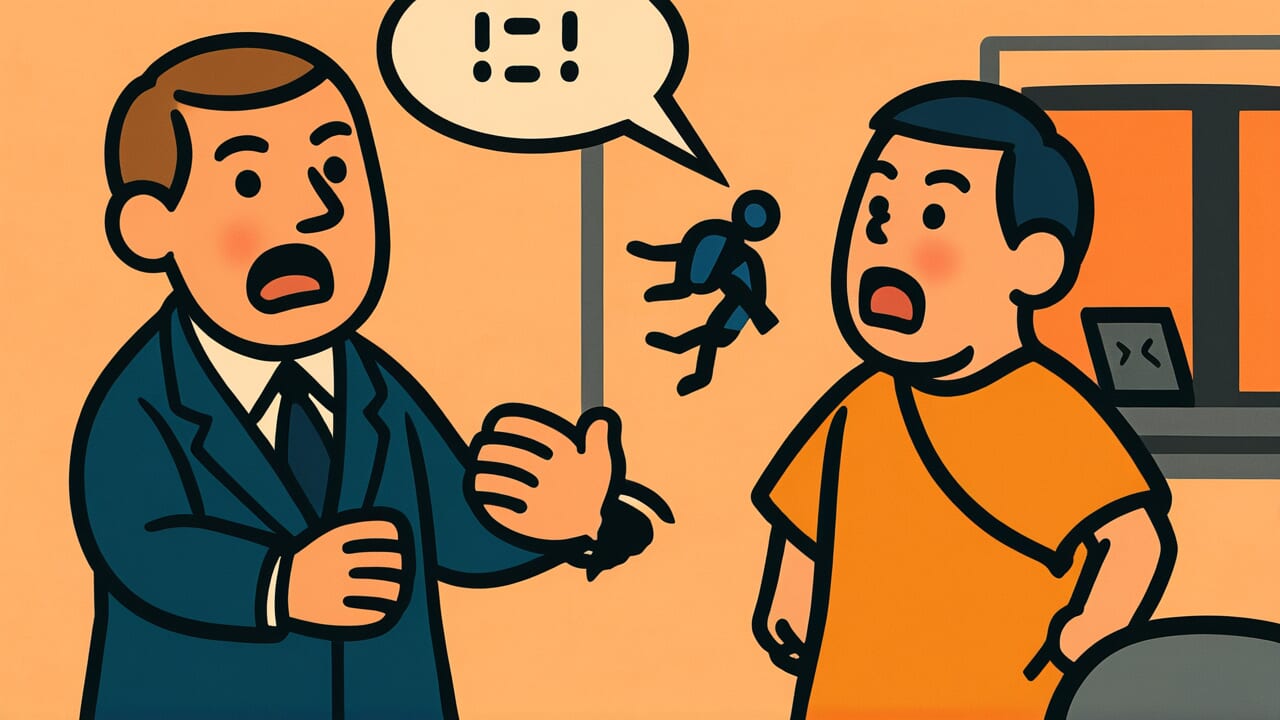How to Read “Getting angry is a loss, fighting is a mistake”
Hara wa tatezon, kenka wa shizon
Meaning of “Getting angry is a loss, fighting is a mistake”
This proverb means that getting angry or fighting only leads to loss in the end.
Getting angry and fighting may feel like you’re releasing your emotions in the moment. But they actually bring nothing good.
Instead, they damage relationships, hurt your reputation, and waste your time and energy. Only losses remain.
People use this proverb to calm down someone who’s getting emotional. It also serves as a reminder when you feel yourself getting angry.
Sometimes people use it when reflecting on past mistakes made in anger.
Even today, this wisdom matters in situations where emotional conflicts arise easily. Think of workplace relationships or arguments on social media.
Anger is a natural emotion. But if you let it control your actions, you end up hurting yourself the most. This is the truth this proverb conveys.
Origin and Etymology
The exact first written appearance of this proverb is unclear. But it likely spread among common people during the Edo period as practical life wisdom.
The structure uses parallel phrases: “tatezon” and “shizon.” This creates a rhythmic, memorable pattern.
“Tatezon” comes from the idiom “hara wo tateru,” which means to get angry. “Zon” literally means loss.
“Shizon” comes from “shizonjiru,” meaning to fail or make a mistake. It shows that fighting leads to bad results.
During the Edo period, people lived close together in narrow row houses. In such tight-knit communities, emotional conflicts caused major problems in daily life.
For merchants, reputation and trust mattered more than anything. If you fought in anger, you might seem to win in the moment.
But in the long run, you damaged relationships and ultimately harmed yourself.
This proverb was born from real-life experience. It’s extremely practical advice for living well.
It expresses the importance of controlling emotions in simple, clear words.
Usage Examples
- I wanted to snap at my boss back then, but I stayed quiet. I remembered that getting angry is a loss, fighting is a mistake. That was the right choice.
- I almost stormed over to yell at my neighbor about our dispute. But getting angry is a loss, fighting is a mistake. Let me try talking calmly first.
Universal Wisdom
Humans are creatures easily controlled by anger. When we’re treated unfairly or our pride is hurt, intense anger wells up inside us.
That anger creates an impulse to explode at the other person immediately.
But this proverb has been passed down for hundreds of years because our ancestors repeatedly experienced one truth.
Actions driven by anger almost always lead to regret.
Anger has strong energy in the moment. But it doesn’t move in a constructive direction. Instead, it works as a force that destroys precious things.
Relationships, trust, reputation, and your own peace of mind. When controlled by anger, we put all of these at risk.
Even if you seem to win a fight, you only realize later how much you’ve lost.
Even if you defeat someone in an argument, it’s not a real victory if you lose the trust of those around you.
This proverb deals with an eternal human theme: the balance between emotion and reason.
Feeling anger is natural. But how you handle it shows your maturity as a person.
When AI Hears This
When you analyze fighting mathematically, a surprising structure emerges. Most people think of fighting as a “win or lose” game.
But it’s actually a “negative non-zero-sum game” where both sides lose.
Let’s quantify what happens when you fight someone in anger. What you lose: time cost, mental exhaustion, damaged relationships.
Say these total minus 10 points. Your opponent also loses minus 10 points. That’s minus 20 points of value disappearing from society.
In a zero-sum game, one person’s minus 10 becomes another’s plus 10. But in a fight, nobody gains anything positive.
What’s more interesting is the connection to “Nash equilibrium” in game theory.
When the other person attacks, responding aggressively seems rational at first glance. But when both choose to attack, both end up with the worst result.
This has the same structure as the “prisoner’s dilemma.” The truly rational choice is the strategy of “not getting angry,” regardless of what the other person does.
The moment we get angry, our brains are controlled by short-term emotional rewards. We fall for the illusion that “fighting back will feel good.”
But if you calmly calculate the costs and benefits, anger is always a negative expected value choice.
This proverb is a warning about the cognitive bias where emotions override rationality.
Lessons for Today
What this proverb teaches modern people is that emotional management determines the quality of your life.
When someone’s social media post makes you angry. When you’re treated unfairly at work. When you clash with family over opinions.
Remember these words in exactly those moments.
Feeling anger isn’t bad. It’s a natural human response. What matters is how you handle that anger.
Don’t react immediately. Take a breath. Don’t attack the other person. Sort out your own emotions instead.
These small choices add up and greatly change your life.
In modern society, emotional reactions are instantly recorded and spread. Words written in momentary anger can lead to irreversible consequences.
That’s why this ancient proverb’s wisdom has more value than ever.
Staying calm isn’t weakness. It’s strength. People who can control their emotions are the ones who truly control their own lives.



Comments